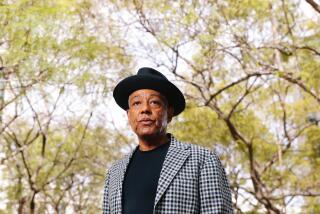They somehow find trouble ‘In Bruges’
- Share via
“After I killed ‘em, I dropped the gun into the Thames, washed the residue off my hands at Burger King and walked home to wait for instructions,” says a voice at the start of “In Bruges,” the first feature by the Irish playwright Martin McDonagh. The voice belongs to Colin Farrell, who plays Ray, a hit man fresh off his first assignment, which he has botched in the worst way. As an unseen Ray speaks, images of the medieval Belgian city of Bruges pass across the screen, squeezing together the ageless and the banal into the tightest space possible.
This is what McDonagh, whose seven plays -- two black comedic trilogies and a dark fantasy -- were famously written in a period of months more than a decade ago, is known for doing. This and having a well-honed sensitivity to what it’s like to be a foreigner in a foreign land, which also sets the tone for the rest of the movie. A dark comedy with a melancholy streak and punchy sense of humor, “In Bruges,” which opened the Sundance Film Festival and follows McDonagh’s Academy Award for a short film, gives us a couple of Englishmen in exile, lowlifes in a city once considered “the Athens of the North,” a pinnacle of civilization.
Ray is in Bruges with his mentor-in-crime, Ken (Brendan Gleeson), on orders from their London boss, Harry (Ralph Fiennes), who still recalls the city fondly from time he spent there as a boy. Ray and Ken, however, have no idea why they’re there or what they’re expected to do next. Ray wants to leave as soon as he arrives, though it’s clear that other things he’d rather not talk about weigh even more heavily on his mind. As they wait for Harry’s call, Ken takes the opportunity to do some sightseeing, but Ray couldn’t be more miserable. “Do you think this is good?” he asks Ken as they float along the canals admiring the buildings, “going ‘round in a boat looking at stuff?”
Ray’s petulant philistinism in the presence of ageless, timeless, perfectly preserved and thoroughly exploited beauty is funny. It also gives Farrell (and McDonagh) license to be as giddily offensive as they want to be. The city plays straight man to Farrell’s outrageous buffoon, silently rebuking his endless monologues about how the paintings in the Groeninge Museum are just “rubbish by spastics,” or how he’d be impressed with Bruges if he hadn’t grown up in Dublin but on a farm “and was retarded.” Then again, there’s something irresistible in the idea that a town criticized for being a living museum would have Russian gun-runners and pretty drug dealers dashing about, selling ketamine to dwarfs on movie sets.
With his elementary school vocabulary, his shuffling gate and a pair of eyebrows that recall “The Hungry, Hungry Caterpillar,” Farrell turns his mercenary killer into a wide-eyed innocent, hilariously vulnerable, if not exactly touching. It’s not until he comes across a film crew shooting a Dutch art movie and meets the drug dealer Chloe (Clemence Poesy) and the dwarf Jimmy (Jordan Prentice) that Ray’s mood lifts and his mind wanders away from the guilt that’s been racking him since he left England. (Occasionally, anyway.) Ray is temporarily distracted from contemplating the fate of his immortal soul thanks to the interventions of some obnoxious Canadians and a skinhead with a gun, at which point Ken, who has finally gotten the call from Harry, is forced to make a big moral choice of his own.
Gleeson is solid as the fatherly Ken, and Fiennes departs hilariously from type as the barracuda Harry, a snaggle-toothed chav cum country squire. All three performances amount to high-wire acts, ostentatious but pretty dazzling nonetheless. You get the sense that McDonagh wants us to conclude that the enriching experience abroad has led all three characters to a deeper understanding of who they are. And maybe it has. But he stops short of pretending that deeper understanding would actually result in change. As Ken says, when Ray tries to make sense of what he has done and determine whether it means he’s going to hell, “Aside from trying to live a good life, I have to reconcile myself to the fact that I have killed people.” Should we really be empathizing?
This is what elevates “In Bruges” from glib, knowing shoot-’em-up to something fresher and brighter. As self-conscious as it is, “In Bruges” manages to toy with cliche while avoiding it entirely. If, as David Mamet has said, the difference between gangster films and film noir is that gangster films sentimentalize the gangster while film noir “depicts a Darwinian zero-sum world, a world without rules and without judgment,” then “In Bruges” is a film noir in which there is plenty of judgment (including Hieronymus Bosch’s painting of “The Last Judgment”), but none of it has any real or lasting consequence. As for sentimentalizing its characters, Ray, Ken and Harry each have a code of honor, but the codes owe more to the movies than to anything real. (And anyway, who needs codes when the only people who seem to have them are always running around shooting guns at people?) Toward the end of the movie, when the lovely and very pregnant hotel owner Marie (Thekla Reuten) suggests that Harry and Ray put down their guns and go home, Harry replies, “Don’t be ridiculous. This is the shootout.” His frame of reference, clearly, is a screen. Marie also says, “You guys are crazy!” and you get the feeling she doesn’t just mean them.
--
--
“In Bruges.” MPAA rating: R for strong bloody violence, pervasive language and some drug use. 1 hour, 41 minutes. In selected theaters.
More to Read
Only good movies
Get the Indie Focus newsletter, Mark Olsen's weekly guide to the world of cinema.
You may occasionally receive promotional content from the Los Angeles Times.










